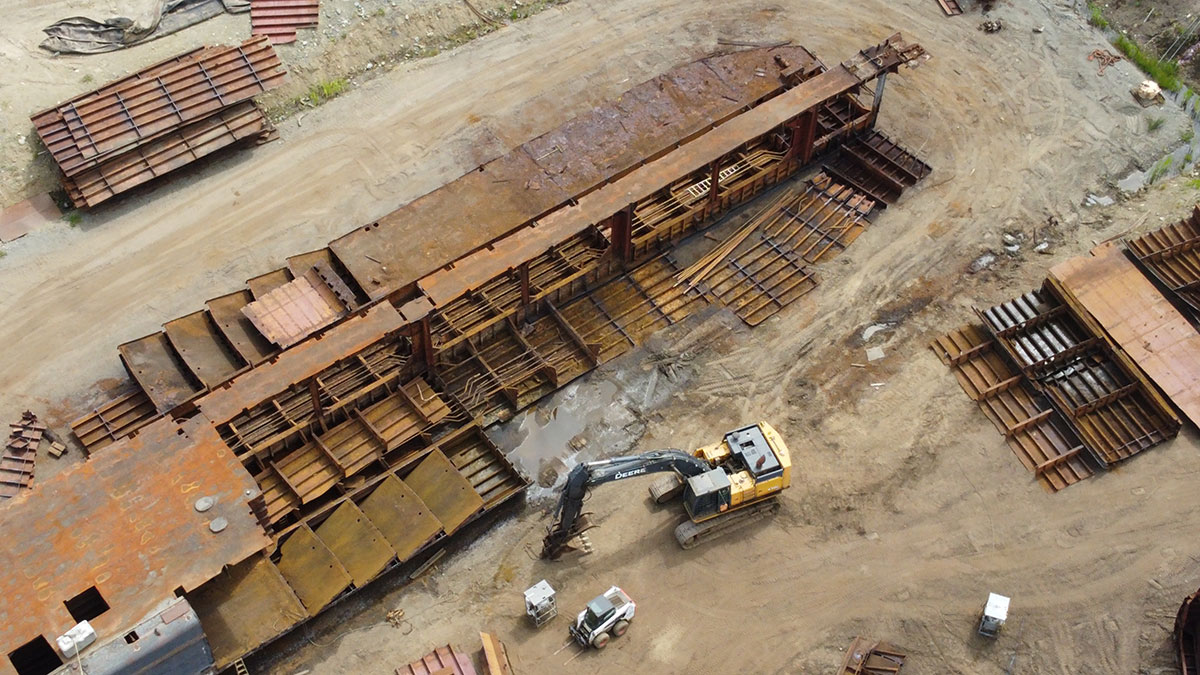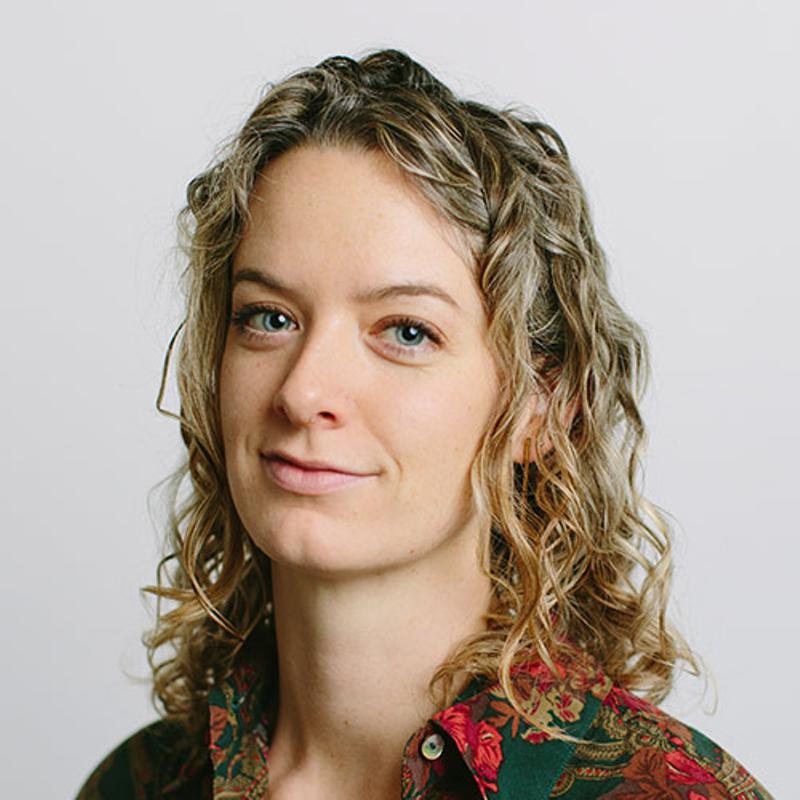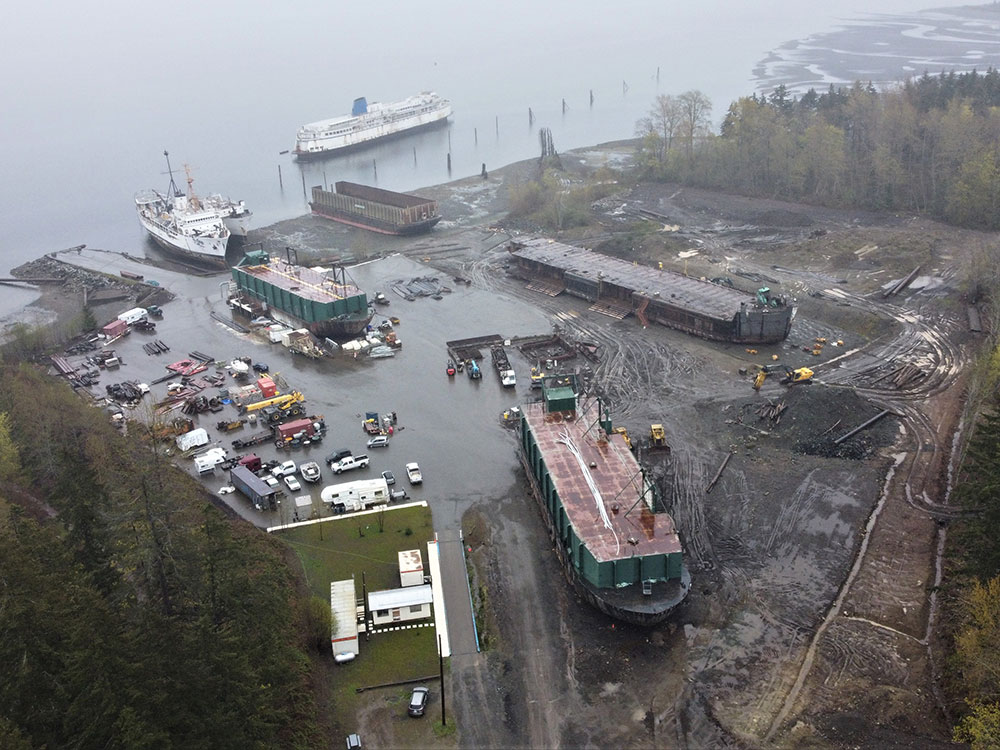[Editor’s note: This piece is a followup to a Tyee special report called 'Where Should Ships Go When They Die?', which took a deep dive into how a pop-up ship recycling company called Deep Water Recovery Ltd. set up shop in Baynes Sound, in an ecologically sensitive area responsible for half of the province’s oyster production. Tomorrow, we examine who watchdogs ship breaking in BC.]
Details about a ship breaking operation being taken to court by a regional government on the east coast of Vancouver Island are shedding light on how potentially harmful industries elbow their way into ecologically sensitive areas in B.C.
According to freedom of information documents acquired from the province by the local advocacy group the Concerned Citizens of Baynes Sound and shared with The Tyee, it appears Deep Water Recovery Ltd. and Union Bay Industries Ltd. have been overstepping regional and provincial regulations since they started ship breaking in December 2020. And the operation was previously issued a cease-and-desist order by the province on Feb. 17, 2021.
But the companies have yet to face regulatory penalties, despite ignoring regional and provincial regulations — including the cease-and-desist order and the requirement under the Declaration on the Rights of Indigenous Peoples Act to consult with First Nations.
Now the Comox Valley Regional District is seeking an injunction against Deep Water Recovery, the ship breaking business, and Union Bay Industries, the company that owns and leases the land to Deep Water. The district is accusing the companies of violating regional bylaws.
Deep Water, Union Bay Industries and the provincial government declined interviews with The Tyee because the case is currently before the courts. The K’ómoks First Nation, whose traditional territory the business is operating on, also declined an interview and pointed The Tyee to a statement from December which sets out the nation’s strong opposition to the ship breaking operations.
The K’ómoks First Nation is not alone in its stance. The Concerned Citizens of Baynes Sound also strongly opposes ship breaking in the region and has been lobbying Canada to adopt regulations around ship breaking that would effectively close down Deep Water’s business.
The Tyee previously reported how Deep Water and its opponents were drawing attention to Canada’s lack of ship breaking regulation.
In a brief interview in July, Deep Water and Union Bay Industries director Mark Jurisich insisted his business is filling a vital role in B.C.’s marine recycling industry and that his companies had always followed the rules.
Deep Water had dismantled and recycled 13 or 14 vessels, which added up to 13,000 to 14,000 tonnes of recycled steel, Jurisich told The Tyee.
He then ended the interview and directed The Tyee to his lawyer for all further questions. His lawyer said he could not comment on an issue before the courts but added Deep Water “intends to vigorously defend the lawsuit.”
Defining ship breaking
According to the NGO Shipbreaking Platform, an international organization with 16 years of experience advocating for a safe, just and clean global industry, ship breaking describes the process of taking apart any vessel, of any type and any size, and sorting the materials into recyclable scrap or garbage.
Jurisich argues his company doesn’t do “ship breaking” because they mainly dismantle barges, which are not ships.
The phrase “ship breaking” also has negative connotations because it is used to refer to unsafe operations in developing nations. Businesses prefer to label themselves as “marine recyclers” to avoid that connotation. For simplicity’s sake, this article will use the NGO Shipbreaking Platform’s definition of ship breaking.
While ship breaking is a vital industry that recycles immense amounts of metal around the world, it can also be extremely hazardous.

Old ships contain asbestos; heavy metals such as mercury and lead; polychlorinated biphenyls, or PCBs; carcinogenic polycyclic aromatic hydrocarbons; contaminated bilge water, and ballast water containing sediment and bio-organisms, says Nicola Mulinaris, senior communications and policy advisor with the NGO Shipbreaking Platform. If ship breaking is not done carefully with highly trained workers, people and environments can be exposed to dangerous chemicals.
This has happened on Canada’s East Coast when a ship breaking operation in Marystown, Newfoundland, exposed hundreds of employees to hazardous materials, including asbestos.
“It depends on the type of vessel and when it was built, but basically every floating vessel that’s reached the end of its life is considered hazardous material,” Mulinaris told The Tyee in February.
Deep Water connections to Union Bay Industries
Union Bay Industries operates on Union Bay on the east side of Vancouver Island, just north of Denman Island. It was founded in 1988 and operated a log sorting business for around 30 years.
In 2019 the company was taken over by new owners who seemed less interested in log sorting and more interested in ship breaking. According to corporate registry documents, Union Bay's current directors are Andrew Bohn, registered in Vanuatu; Robert Bohn, registered in California, and Mark Jurisich, registered in Courtenay, B.C.
Robert Bohn is CEO and works out of the corporate offices in Port Villa, Vanuatu, according to an email from 2019 obtained through freedom of information legislation. The parent company is the Bayer Group. (This is different from the pharmaceutical company Bayer AG, said a Bayer AG spokesperson.)
Vanuatu, an ocean nation in the South Pacific, is known as a tax haven and a flag of convenience by the International Transport Workers’ Federation, the world’s leading transport authority.
Deep Water Recovery’s website says the business was incorporated in 2016, but it only started ship breaking in December 2020.
Deep Water’s directors are Jurisich and Andrew Bohn, according to corporate registry documents.
Union Bay and Deep Water are registered under the same address. Union Bay leases Crown land from the province and in turn leases it to Deep Water.
Both companies are named in the Comox Valley Regional District’s lawsuit.
The lawsuit, which was filed in the B.C. Supreme Court on April 14, alleges Deep Water is ship breaking, which “is not a permitted use of the property under the zoning bylaw and is prohibited under the zoning bylaw.” It also alleges Deep Water was housing people in RVs on the industrial site and that the company altered a fish-bearing stream in the neighbouring park without a permit.
The regional district is asking for an injunction to stop all operations, to prohibit people from living on site and for Deep Water and Union Bay to pay for park restoration.
In its response to the civil claim, Deep Water and Union Bay Industries deny these allegations and say government staff from the province and regional district knew about their ship breaking business as early as October 2019. The companies allege the regional district is acting “in bad faith and for an improper purpose” after being pressured by the Concerned Citizens of Baynes Sound.
Both times Jurisich spoke with The Tyee, he said the lawsuit is a political one, used to drum up support for regional directors during an election year.
That’s “absolutely false,” says Daniel Arbour, director of Comox Valley Regional District Area A, which covers Baynes Sound and Denman and Hornby islands. In small communities there is a lot of support for industry, even heavy industry, so it’s not as if all voters are against the business, he says.
Arbour added that the court case is just about making sure that when a “significant industry” moves into town it knows it has to follow the regional bylaws.
Jurisich also says the Concerned Citizens’ opposition to his business was rooted in the fact that having an operational industrial site next door lowered their members’ property values.
But some of the information Jurisich offered during the interview in February contradicts denials made in response to the lawsuit.
Jurisich told The Tyee he had rented a trailer for a family, including an employee’s wife and two children, for 90 days so they could live on site while their home was being remodelled.
Jurisich also told The Tyee his company spent $3,500 diverting the waterway that ran through Glover Park. “Did we intrude in the park? Yes we did — a tiny little bit at the top, we’ve never denied that,” he says. “We said to the regional district: we came in here and cleaned this up because our neighbour had an issue with water.”
None of the allegations have been proven in court. Lawyers for both parties are currently putting together evidence they’ll use in the case and are waiting for the B.C. Supreme Court to choose a hearing date, a Comox Valley Regional District spokesperson told The Tyee.
Most BC shipyards can break ships
Most shipyards in B.C. can break ships, according to a Canadian Maritime Engineering Ltd. employee. When a government or military vessel reaches the end of its life shipyards like Point Hope Maritime Ltd., Seaspan Shipyards or the Esquimalt Graving Dock could bid on the contract to dismantle the ship, they said. All shipyards are equipped to “do repairs, retrofits, recycling, scrap, you name it — the whole nine yards,” they add.
Even these companies can have accidents. In March a worker was seriously injured while dismantling an old Coast Guard vessel at Canadian Maritime Engineering in Nanaimo.
Seaspan is in contract with Deep Water to dismantle barges.
Canada's oldest shipbreaker is also opening a BC operation
Marine Recycling Corp. has been breaking ships in Canada for 60 years at its shipyards in Ontario and Nova Scotia. It also does mobile wreck removal, salvage and environmental remediation all throughout the country. In February, company president Jordan Elliott told The Tyee his business more or less meets the domestic ship breaking demand and dominates the industry because the volatile cost of steel and the high cost of building a business with highly trained employees and highly specialized facilities keeps most entrepreneurs away from the industry.
So while most shipyards can break ships, there aren't that many dedicated full-time ship breaking operations in Canada, he says.
There's only a handful of ship recycling companies in the world that have been in business for more than 10 years, Elliott says. Most new companies “really fuck it up” because they're not set up to handle hazardous waste or run up against regulatory issues like what's happening with Deep Water, he says.
Elliott says his employees are skilled at following more regulations than shipbuilders do, because ship breaking involves towing, construction, diving, handling hazardous material and more.
Jurisich refused to answer questions about his employees.
Elliott also says his company has been careful to promote a clean, safe and just industry, which meant regulators did not need to spend time and money writing regulations to police his business.
Marine Recycling Corp. is opening its third shipyard in Port Mellon, B.C., on the Sunshine Coast in Howe Sound, just to the east of Gambier Island.
Elliott says he looked at the Union Bay Industries site during his five-year-long search to find a facility where he could break ships in B.C. He says the Union Bay facility is a potentially suitable place to dismantle ships but that's only half the battle.
“If it's not zoned properly you’re coming out of the gate non-compliant,” he says. “I understood I wouldn't be successful trying to rezone that property. That's why I didn't buy it.” Plus, the site sits on an important aquaculture site — not ideal for ship breaking, he says.
Elliott told The Tyee that the Port Mellon shipyard dry docked its first vessel at the start of July and has signed a contract to ship break the Seaspan Ferries’ Carrier Princess.
Canadian government and military ships are legally required to be dismantled within Canada, but Elliott says he’d like to see more private companies, like BC Ferries and Great Lakes freighter operators, dismantle all their ships domestically too.
Ship breaking is an important piece of the economies of Turkey, India, Pakistan and Bangladesh, which feed the recycled steel back into their economies.
But Elliott says these industries, especially in Southeast Asia, promote “carnage” with daily worker deaths. NGO Shipbreaking Platform’s Mulinaris says ship breaking in Southeast Asia uses exploitive and dangerous working conditions that can impact environments, workers and their families when hazardous materials are brought home on employee’s clothes. Bangladesh also uses child labour, he adds.
NDP MP for Courtenay-Alberni Gord Johns has been asking Canada to adopt ship breaking regulations that would promote a domestic industry and prevent hazardous materials from being exported to developing nations.
During the 2022 AGM of the Association of Vancouver Island and Coastal Communities, the Comox Valley Regional District brought forward a motion for the association and the Union of BC Municipalities to pressure senior levels of government to adopt stringent ship breaking regulations, create a registry of approved ship breaking facilities in B.C. and invest in “qualified” ship breaking facilities. The motion passed unanimously.
Tomorrow, we’ll examine how regulating a potentially harmful industry was downloaded by the province onto a lower level of government. ![]()
Read more: Rights + Justice, Labour + Industry, Environment
















Tyee Commenting Guidelines
Comments that violate guidelines risk being deleted, and violations may result in a temporary or permanent user ban. Maintain the spirit of good conversation to stay in the discussion.
*Please note The Tyee is not a forum for spreading misinformation about COVID-19, denying its existence or minimizing its risk to public health.
Do:
Do not: